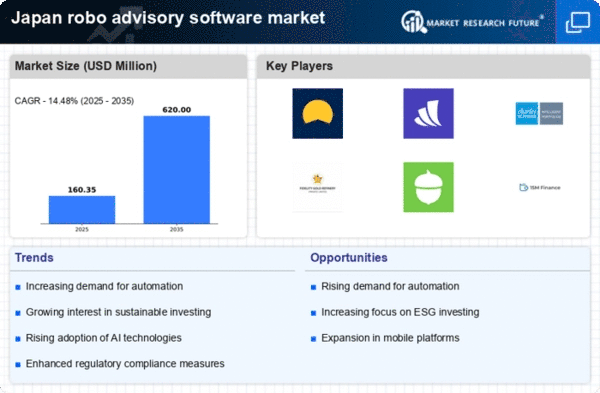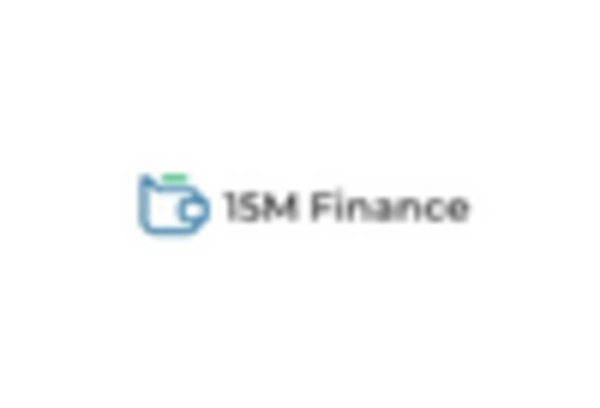Increased Focus on Retirement Planning
An increased focus on retirement planning is emerging as a significant driver for the robo advisory-software market in Japan. With an aging population and rising concerns about financial security in retirement, individuals are actively seeking tools to help them prepare for their future. Robo advisors, which often provide retirement planning features and automated investment strategies, are well-positioned to meet this demand. As more people recognize the importance of early and effective retirement planning, the adoption of robo advisory services is likely to rise. This trend indicates a growing market opportunity for firms that offer comprehensive retirement solutions within their robo advisory-software offerings.
Shift Towards Digital Financial Services
The shift towards digital financial services is a key driver of the robo advisory-software market in Japan. With the proliferation of smartphones and internet access, consumers are increasingly turning to digital platforms for their financial needs. This trend is reflected in the growing number of users engaging with robo advisory services, as they offer convenience and accessibility that traditional financial services may lack. According to recent data, the number of users of robo advisory platforms in Japan has increased by over 30% in the past year alone. This shift towards digital solutions is likely to continue, as consumers seek efficient and user-friendly ways to manage their investments, thereby propelling the growth of the robo advisory-software market.
Rise of Financial Literacy Among Consumers
The rise of financial literacy among consumers in Japan is significantly impacting the robo advisory-software market. As individuals become more educated about financial products and investment strategies, they are increasingly inclined to take control of their financial futures. This trend is evident in the growing number of online resources and educational platforms that empower consumers to make informed investment decisions. Consequently, a more financially literate population is likely to embrace robo advisory services, viewing them as accessible tools for managing investments. The increasing demand for self-directed investment solutions may drive growth in the robo advisory-software market, as these platforms cater to the needs of a more knowledgeable clientele.
Technological Advancements in Financial Services
Technological advancements are playing a crucial role in shaping the robo advisory-software market in Japan. Innovations such as machine learning, big data analytics, and artificial intelligence are enhancing the capabilities of robo advisors, allowing them to provide more personalized and efficient services. For instance, the integration of AI algorithms enables these platforms to analyze vast amounts of data to offer tailored investment strategies based on individual risk profiles and financial goals. As technology continues to evolve, it is expected that the robo advisory-software market will witness increased adoption, with more sophisticated tools being developed to meet the diverse needs of investors. This trend suggests a promising future for the industry, as firms that leverage cutting-edge technology may gain a competitive edge.
Growing Demand for Cost-Effective Investment Solutions
The robo advisory-software market in Japan is experiencing a notable surge in demand for cost-effective investment solutions. As traditional financial advisory services often entail high fees, many investors are seeking alternatives that offer lower costs without compromising on quality. Robo advisors typically charge fees ranging from 0.25% to 0.75% of assets under management, significantly less than the 1% to 2% charged by traditional advisors. This shift towards more affordable options is particularly appealing to younger investors and those with smaller portfolios, thereby expanding the customer base for robo advisory services. The increasing awareness of investment management costs is likely to drive further growth in the robo advisory-software market, as more individuals recognize the potential for enhanced returns through lower fees.
















